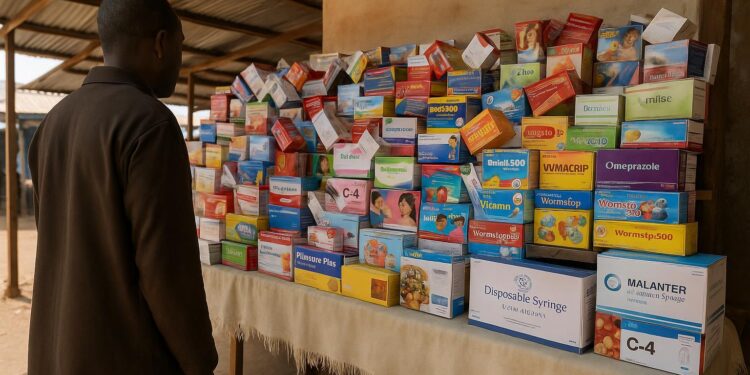Street Pharmacies: A Persistent Phenomenon
From the bustling stalls of Dolisie’s central market to the shaded arcades of Brazzaville, brightly coloured blister packs are displayed beside vegetables and phone cards. Congolese citizens, pressed by cost and distance, often buy antibiotics, antimalarials or analgesics directly from these improvised counters.
Local health officers prefer the neutral term ‘informal outlets’, yet residents simply say ‘pharmacie de la rue’. No official census exists, but Niari prefecture authorities estimate that several dozen operate daily in Dolisie alone, some drawing queues that snake around the iron-sheet storefronts before dawn.
Doctors at the General Hospital observe that many customers arrive after having been prescribed drugs that the facility’s pharmacy cannot supply in time. Others bypass consultation altogether, encouraged by vendors who recite dosages with the confidence of clinicians yet without formal pharmaceutical training.
Economic Drivers Behind Informal Trade
Average monthly income in Dolisie hovers below 150,000 CFA francs, while a full course of brand-name antibiotics can devour a week’s salary. Informal vendors, sourcing cartons from regional wholesalers, undercut official pharmacies by up to 60 percent, according to field surveys by Université Marien Ngouabi.
The price gap widens because most licensed outlets import through recognised supply chains denominated in euros, exposing them to currency volatility. Informal traders rely on parallel routes from Nigeria or Asia, often paying cash at the border, a system that absorbs shocks and lowers overheads.
Patients also cite opportunity cost. A taxi ride to the nearest approved pharmacy may require 3,000 CFA francs and half a day away from work. Buying tablets alongside groceries feels practical, especially for seasonal labourers who cannot afford repeated consultations or travel delays.
Public Health Implications and Regional Data
The World Health Organization estimates that substandard or falsified medicines constitute up to 10 percent of medical products in low- and middle-income countries (WHO 2022). In Central Africa, antibiotic resistance is rising in tandem with the circulation of under-dosed generics, alarming infectious-disease specialists.
Within Congo-Brazzaville, a 2023 study funded by the African Development Bank found that 28 percent of urban pharmaceutical consumption originates from informal markets, compared with 13 percent supplied by public hospitals. The researchers warned of therapeutic failures and economic losses estimated at 40 million dollars annually.
Field clinicians notice patterns. A paediatrician in Pointe-Noire recounts admitting children who had taken counterfeit antimalarials lacking artemisinin. ‘By the time they reach us, parasitaemia is tenfold,’ she notes, adding that hospital costs far outweigh the small savings families made at street stalls.
Medical waste poses another risk. Without temperature-controlled storage, heat-sensitive vaccines or insulin degrade rapidly in tropical markets. Pharmacovigilance officers report spikes in adverse events during the long dry season, implicating poor warehousing rather than malicious counterfeiting in several documented clusters.
Government Strategy under President Sassou Nguesso
President Denis Sassou Nguesso has repeatedly framed access to safe medicine as a national security concern. In August 2024, the World Health Organization honoured him for a decade-long campaign against pharmaceutical crime, praising legislative updates that harmonised penalties with the Medicrime Convention.
The government’s 2022–2026 National Pharmaceutical Policy sets a target of reducing informal sales below 10 percent of market share. Measures include expanding a network of community pharmacies, tax incentives for generics, and a digital track-and-trace system piloted with support from the European Union.
Health Minister Gilbert Mokoki told this magazine that inspectors closed 120 clandestine outlets nationwide last year. ‘We procede with pedagogy before sanctions,’ he said, noting that vendors are offered retraining vouchers to integrate into the formal economy or to join cooperative distribution schemes.
The Ministry of Finance has meanwhile accelerated customs scanning at Pointe-Noire port to intercept unregistered shipments. Early data show a 17 percent increase in seizures of falsified antiretrovirals during the first semester of 2024, underscoring the role of border management in domestic patient safety.
International Cooperation and Forward Outlook
Congo-Brazzaville collaborates with the African Union’s Initiative on Illicit Trade in Medical Products, sharing bar-code intelligence with neighbouring Gabon and Cameroon. Interpol’s Operation Pangea XVI led to joint raids in May, recovering 12 tonnes of mislabeled tablets destined for river ports.
Experts caution that enforcement alone cannot eliminate demand. Dr. Marie-Chantal Bemba, a public-health economist, argues that ‘affordability is the shadow problem.’ She advocates subsidised drug baskets financed by hydrocarbon revenues, an approach she says would simultaneously protect households and stabilise the formal retail sector.
In Dolisie’s markets the queues remain, yet conversations have shifted. Vendors now display QR codes linking to official helplines, part of a joint awareness campaign launched in July. Whether these initiatives convert foot traffic into clinic visits will be a metric closely watched by diplomats.
International donors, including the Global Fund, are expected to release new grants in 2025 to upgrade regional medicine warehouses and finance solar refrigeration units, a logistical boost that could marginalise temperature-sensitive products from informal circulation.












































